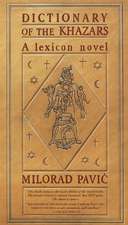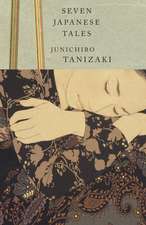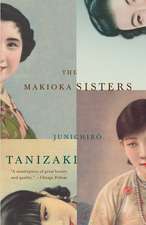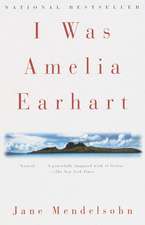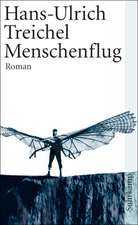Lost
Autor Hans-Ulrich Treichelen Limba Engleză Paperback – 30 sep 2000
As a young boy, the narrator learns that his parents lost their firstborn son while fleeing the advancing Russian Army in 1945. Though his family has comfortably settled in Westphalen, the memory of Arnold continues to haunt them. The narrator shares his parents' anguish, but he can't resist feeling resentful, for his brother's absence is the most defining aspect of his life. When his parents learn of a foundling that resembles Arnold, they embark on a horrific quest to claim him as their own, only to endure a series of unanticipated twists that lead to a startling denouement. At turns uncanny, subtle, and perversely amusing, Lost is a chilling novel of mesmerizing power.
Preț: 109.24 lei
Nou
Puncte Express: 164
Preț estimativ în valută:
20.91€ • 21.55$ • 17.65£
20.91€ • 21.55$ • 17.65£
Carte disponibilă
Livrare economică 10-24 februarie
Preluare comenzi: 021 569.72.76
Specificații
ISBN-13: 9780375706226
ISBN-10: 0375706224
Pagini: 144
Dimensiuni: 133 x 203 x 11 mm
Greutate: 0.18 kg
Editura: Vintage Publishing
ISBN-10: 0375706224
Pagini: 144
Dimensiuni: 133 x 203 x 11 mm
Greutate: 0.18 kg
Editura: Vintage Publishing
Recenzii
"A brilliant tragicomic story."--The New York Times
"Treichel's poetic genius allows the fertile ambiguities that Grass and Heinrich Böll planted so adroitly a generation ago to water the guilt and obsession of this particular...family."--Los Angeles Times Book Review
"Treichel's poetic genius allows the fertile ambiguities that Grass and Heinrich Böll planted so adroitly a generation ago to water the guilt and obsession of this particular...family."--Los Angeles Times Book Review
Notă biografică
Hans-Ulrich Treichel is a professor of German literature at the University of Leipzig.
Translated from the German by Carol Brown Janeway.
Translated from the German by Carol Brown Janeway.
Extras
My brother squatted on a white blanket and laughed into the camera. That was during the war, my mother said, the last year of the war, at home. Home was the East, and my mother had been born in the East. As my mother spoke the words "at home" she began to cry, as she so often did when the subject of my brother came up. His name was Arnold, like my father's. Arnold was a happy child, said my mother, looking at the photograph. She didn't say any more, and I didn't say anything either, and looked at Arnold squatting on a white blanket and being happy. I don't know what was making him happy, it was the war after all, and besides that he was in the East, and he was still happy. I envied him his happiness, I envied him the white blanket, and I envied him his place in the photo album, too. Arnold was right at the front of the album, ahead even of my parents' wedding pictures and the portraits of the grandparents, while I was way at the back. And Arnold's picture was quite big, while most of the photos I was in were small, not to say tiny. Snapshots taken by my parents with what they called a Box Brownie, and apparently this box thing could only make little tiny photos. You had to look at the photos with me in them very carefully to recognize anything at all. For example, one of these tiny snapshots was of a pool with several children in it, and one of them was me. All you could see of me was my head, because I didn't know how to swim then, and I was sitting in the water, which came up almost to my chin. And my head was partly hidden by a child standing in the water in front of me, so that the minuscule photo with me in it only showed part of my head right above the surface of the water. And what's more there was a shadow on the visible part of my head which was probably made by the child standing in front of me, so that the only bit of me you could really see was my right eye. While my brother Arnold looked not just happy but important even when he was a baby, in most of the photos from my childhood I am either only partly visible or sometimes not really visible at all. One of the times I was not really visible at all was in the photo of my christening. My mother held a white cushion on her arm, with a white coverlet over it. Under the coverlet was me, which you could tell because it had been pushed aside at the bottom of the cushion and the toes of a baby foot were peeking out. All subsequent photos taken of me in my childhood continued this tradition, one way or the other, except that in later photos the foot was replaced by a right arm, or half a profile, or an eye, as in the picture from the swimming pool. I would have accepted my truncated self in the family album, if my mother hadn't made a habit of reaching for the album to show me the pictures in it. Every time, the little tiny Box Brownie photos that showed me or rather various parts of me were leafed through hastily, while the photo of Arnold, which seemed life-size to me, was the object of endless contemplation. As a result I usually sat next to my mother on the sofa looking as miserable as I felt, and staring at cheerful and un-miserable Arnold, as my mother got more and more upset. I was still a small child when I became accustomed to my mother's tears, and I didn't spend any time wondering why Arnold's face made her cry so often. And the fact that although Arnold was my brother, I had never seen him in the flesh, didn't bother me in those first years, particularly because I was quite happy not having to share my room with him. At some point my mother explained what had happened to Arnold, inasmuch as she told me he had starved to death during their flight from the Russians. "Starved," said my mother, "starved in my arms." Because she herself had been more or less starving during the long trek from the East to the West, and she had no milk to feed the baby, and nothing else besides. When I asked if nobody else had had milk for the baby either, she said nothing, nor did she answer all my other, more detailed questions about the flight and my brother starving. So Arnold was dead, which was certainly very sad, but it made it easier for me to deal with his photo. Happy, easygoing Arnold even struck a chord in me, and I was proud to have a brother who was dead and still looked so happy and easygoing. I mourned Arnold and was proud of him, and I shared my room with him and wished him all the milk in the world. I had a dead brother and felt I had been singled out by fate. None of my playmates had a dead brother, let alone one who'd starved to death while fleeing the Russians.



